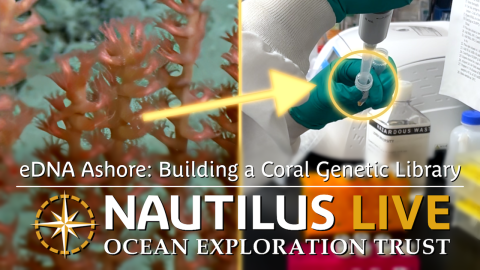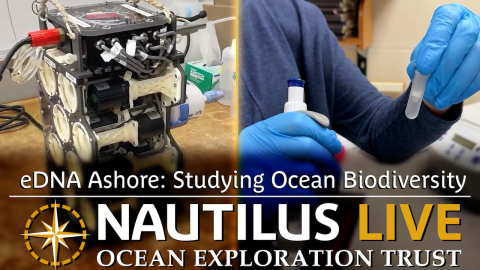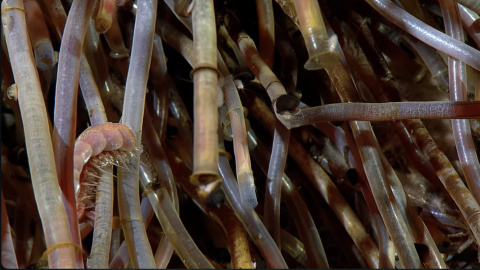Folau i lagi mā : Keep an Open Mind
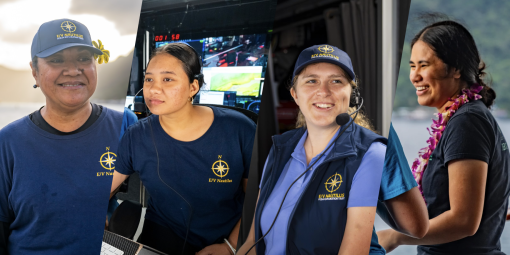
During the E Mamana Ou Gataifale I expedition, we were delighted to have Magdalene Augafa-Leauanae, Program Director at the American Samoa Department of Education Department of Curriculum and Instruction, sail as our Guest Educator.
We were also thrilled to host three passionate interns from OET NOAA National Marine Sanctuary of American Samoa: Talofa Fe’a, Liualevaiosina Le'iato, and Ella Ashford.
At the end of the expedition, Communications Lead Marley Parker sat down with these four vibrant women to discuss what they learned, what surprised them, and what memories they will take with them after sailing on Nautilus for the first time.
How did you feel when you first came on board E/V Nautilus? Was there anything that surprised you or that you didn’t expect?
TF: I didn’t really know what to expect, since I didn’t have prior experience on a research vessel – I was surprised by everything. I was impressed with the diversity of people here. I didn’t expect to get so seasick!
EA: Something that surprised me was how everyone on board was ready and willing to share information about their work. On my first day on board, I spent almost the entire day with the navigation team. I wasn’t assigned to their department, but they invited me to participate. They explained the mapping operations, and Lynette showed me how to do an XBT cast. I’ve had the same experience in every department – like talking with Roy about the DAP (Deep Autonomous Profiler) or helping the Mesobot team with annotating their videos. I’m so amazed at everyone’s willingness to share knowledge.
MAL: It was a bit scary for me at first – it’s overwhelming to meet so many new people at once. I didn’t really know what I was getting myself into! But as soon as we started the expedition and I got to know people, I felt welcome. Education and outreach are so important to OET – I knew that before I came on board. Because I’m from a science background, science education is dear to me. Whenever I find opportunities to share science with schools, I grab them. This was definitely one of them.
What does it mean to you to join an expedition in your “backyard”?
MAL: It means a lot. I look out at these waters every day. But this is my first time experiencing all that the ocean can give us. And now I can relate that to our people. I can tell them this is what’s going on out there. It’s not just in textbooks or new stories – it exists in real life! It’s something that we should all be passionate about. We should all be stewards of the ocean.
LL: It’s a phenomenal opportunity – to be from this place and to do such cool work with people who are experts in their respective fields. You don’t really see a lot of people from Samoa doing deep ocean work. Yet! It’s awesome to see our own people in spaces like this.
TF: I represent my community in this kind of work, which is beyond my imagination. It’s such an amazing learning experience given that these are such familiar waters on the surface, but beneath the surface, I have such limited knowledge. I came here just wanting to learn and wanting to know what’s happening beneath the surface. I feel like I have a much better understanding of that now.
Tell me about some of the most memorable moments from your time on board. What memories will stick in your mind?
TF: I never expected to be able to do so many different types of activities! Working with eDNA team at 4 am – that’s something I will always remember. Doing the communications and education/outreach has been so fun. “DAPing it up” is now a scientific term! Every moment I’ve spent out here has been incredibly memorable.
MAL: There have been many magical moments. I love watching the vehicle deployments and recoveries in person. And seeing American Samoa from this perspective – from the sea – it’s just so beautiful.
I think the most memorable part of this expedition will be the people. Everyone is just so welcoming. We talk story and learn from one another. My shipmates are the greatest learning experiences.
EA: A memory that’s burned in my mind is getting up at 2 or 3 am, dragging myself to the Wet Lab, and feeling exhausted – but as soon as I walk in, it’s like another world. Everyone is in the same boat working really hard to process these samples. We play music, make jokes, and lift each other’s spirits. That experience has shifted my perspective of what science can be. It doesn’t have to always be a formal process. It can be fun, silly, and rewarding – and still accomplish some really important, valuable scientific tasks.
LL: One of the most impactful things was seeing the fellowship and collaboration between all the team members. Even when things were stressful or conditions weren’t ideal, everyone was very professional.
What have you learned? What will you take away from this experience?
MAL: I think this is one of the best experiences I’ve ever had. Besides all the learning and socializing, there is also time for self-reflection. Spending almost three weeks away from home – getting outside of my normal routine – it’s eye-opening, both physically and mentally.
LL: Everything we did in the Wet Lab! All the sampling, the techniques I learned – I will definitely take those experiences with me as I move forward in the field of marine biology. I’m excited to bring that knowledge into different spaces, especially since I’ve only worked in shallow water environments before this. I think my experiences on Nautilus will make me a more well-rounded student and researcher.
What advice would you give to future guest educators on Nautilus?
MAL: The best advice I can give is to ask lots of questions. It doesn’t hurt to be a student all over again. As educators, we sometimes think we know everything already, but it’s helpful to put yourself in the shoes of a student. If you’re not sure how something works, ask a question. Then ask another question. Educators should never stop learning.
What advice would you give to future interns planning to sail on Nautilus?
LL: Don’t be afraid to jump into things! I was on board as the Ocean Science intern, but I also learned about what the engineering, data, and mapping teams were doing. The Nautilus team is so open to sharing knowledge – as long as you’re curious and willing to learn. It can be intimidating to ask questions but the culture on this ship fosters a welcoming learning environment – it’s okay to not know something, and it’s okay to ask questions.
EA: Keep an open mind. Be open to new opportunities. It’s easy to get stuck in thinking you need to stay in one role. Branch out and have fun! Enjoy yourself! Talk to everyone. In just a few weeks, your shipmates could become some of your closest friends and mentors.
What Samoan word or phrase would you use to describe your first experience living and working at sea?
MAL: Folau i lagi mā is a phrase that means to keep an open mind. In any journey, there will be obstacles. You have to be flexible and open to new possibilities. You may start a journey with certain goals or objectives, but things don’t always turn out the way you expect them to – especially when you’re working in the open ocean.
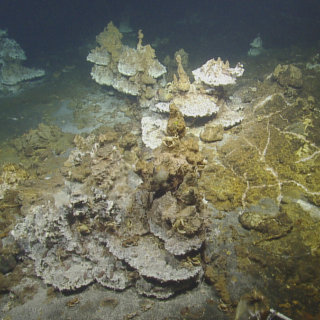
E Mamana Ou Gataifale I - American Samoa
Over the last three years, the Ocean Exploration Cooperative Institute has been advancing the integration of multiple exploration technologies aboard E/V Nautilus, and this year, we bring these new capacities to American Samoa.
